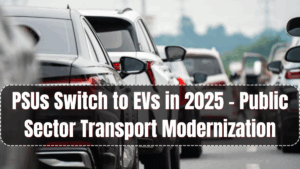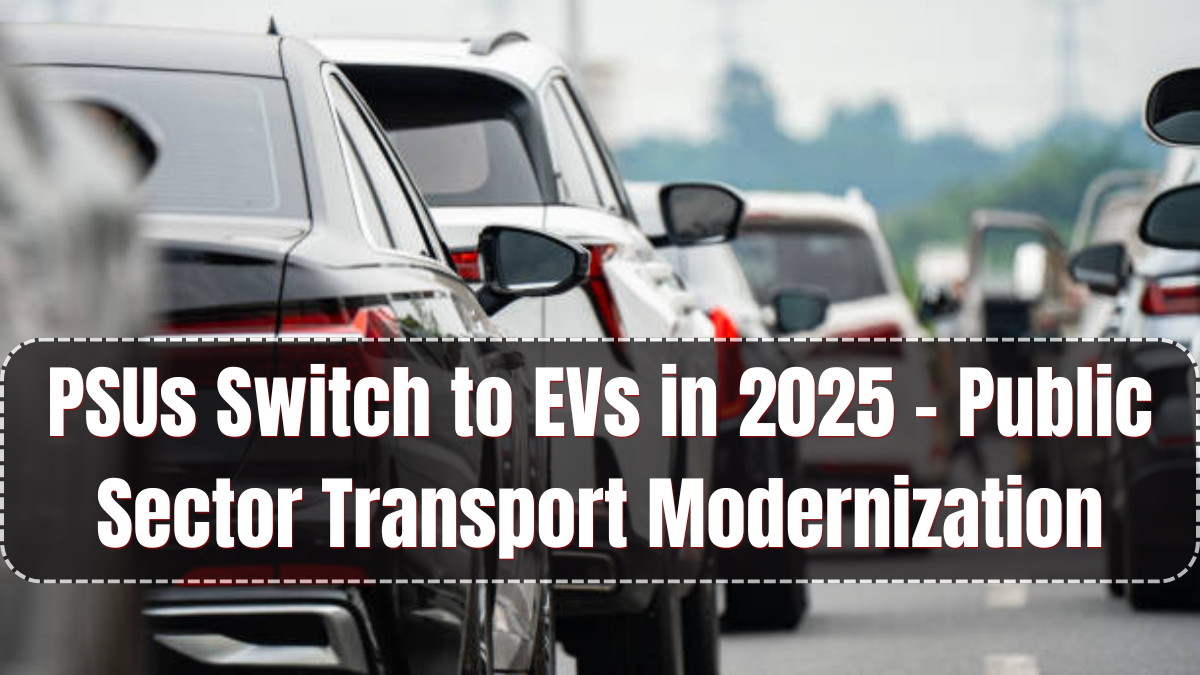In a major shift toward green mobility, several Public Sector Undertakings (PSUs) across India are aggressively transitioning to electric vehicles (EVs) in 2025. This shift comes as part of the Indian government’s sustainability drive, which aims to decarbonize operations, lower fuel costs, and encourage indigenous EV production.
From power utilities and oil companies to steel plants and defense manufacturers, PSUs are replacing petrol and diesel fleets with electric alternatives under new policy mandates and financial incentives.

What’s Driving the EV Shift in PSUs?
The move toward EV adoption is motivated by several key factors:
-
Government mandates: The Ministry of Heavy Industries has made it mandatory for all PSUs to electrify at least 30% of their fleet by the end of FY 2025–26.
-
Fuel cost savings: Transitioning to EVs is projected to cut fuel expenses by up to 60% annually.
-
ESG targets: Public sector enterprises are aligning with global environmental, social, and governance (ESG) benchmarks.
-
FAME II & FAME III incentives: PSUs benefit from financial subsidies, GST reduction, and priority registration for EVs under the central government’s Faster Adoption and Manufacturing of Hybrid and Electric Vehicles schemes.
Leading PSUs Leading the EV Movement
Several major PSUs are leading the EV adoption charge in 2025:
1. NTPC Limited
India’s largest energy conglomerate has deployed over 1,200 electric cars and 200 charging stations across its operational areas. NTPC is also developing EV charging corridors near its plants.
2. Indian Oil Corporation (IOCL)
IOCL has transitioned 25% of its service vehicles to EVs and is installing public fast chargers at 10,000 petrol stations by end-2025.
3. Steel Authority of India Limited (SAIL)
SAIL plants in Bokaro and Rourkela are replacing internal diesel-run logistics vehicles with electric alternatives to reduce emissions inside the plant area.
4. Bharat Heavy Electricals Ltd (BHEL)
BHEL has partnered with EV startups to supply battery-powered transporters within industrial campuses and for short-range logistics.
How Are Fleets Being Electrified?
The PSU vehicle modernization is taking place across three verticals:
-
Employee transport vehicles: Sedans and small hatchbacks used for internal movement are being replaced by electric cars such as Tata Tigor EV, Mahindra e-Verito, and Nexon EV.
-
Internal cargo & logistics: Electric mini trucks and 3-wheelers are being used to move goods inside factory or refinery campuses.
-
Electric buses: For larger campuses and city-wide employee transport, e-buses are being introduced under state transport corporation partnerships.
Challenges in the Transition
Despite rapid adoption, PSUs still face challenges such as:
-
Charging infrastructure gaps in remote and high-altitude operational zones
-
Higher upfront costs for commercial-grade electric vehicles
-
Battery life concerns for vehicles operating under high temperature and dust conditions
-
Procurement delays due to limited approved vendors in government e-marketplace (GeM)
The government is actively working to address these with upgraded tender guidelines and support through state EV policies.
Impact on the Broader Ecosystem
PSUs adopting EVs are creating ripple effects across the automotive industry:
-
Boost to domestic EV manufacturers like Tata Motors, Mahindra Electric, Ashok Leyland, and Eicher
-
Expansion of charging networks by PSU-run oil marketing companies like HPCL and BPCL
-
Job creation in the EV service, maintenance, and battery recycling sectors
-
Promotion of clean tech innovation with R&D collaborations between PSUs and startups
This mass adoption also sends a powerful message to private companies, municipalities, and educational institutions to accelerate their own EV plans.
FAQs
Why are PSUs adopting electric vehicles in 2025?
To meet green mobility goals, reduce fuel costs, and align with central government directives on environmental sustainability.
Which PSUs have adopted EVs so far?
NTPC, IOCL, BHEL, SAIL, and ONGC are among the key PSUs switching to electric fleets.
What kinds of vehicles are being electrified?
From small cars to cargo vans and electric buses – all operational fleet categories are being converted to EVs.
Are PSUs setting up their own charging stations?
Yes, many are installing EV charging points within campuses and collaborating with energy partners for public infrastructure.
Is the shift limited to metro cities?
No, even PSUs in Tier 2 and Tier 3 towns, remote plants, and border areas are participating in the electrification effort.
Click here to know more.
